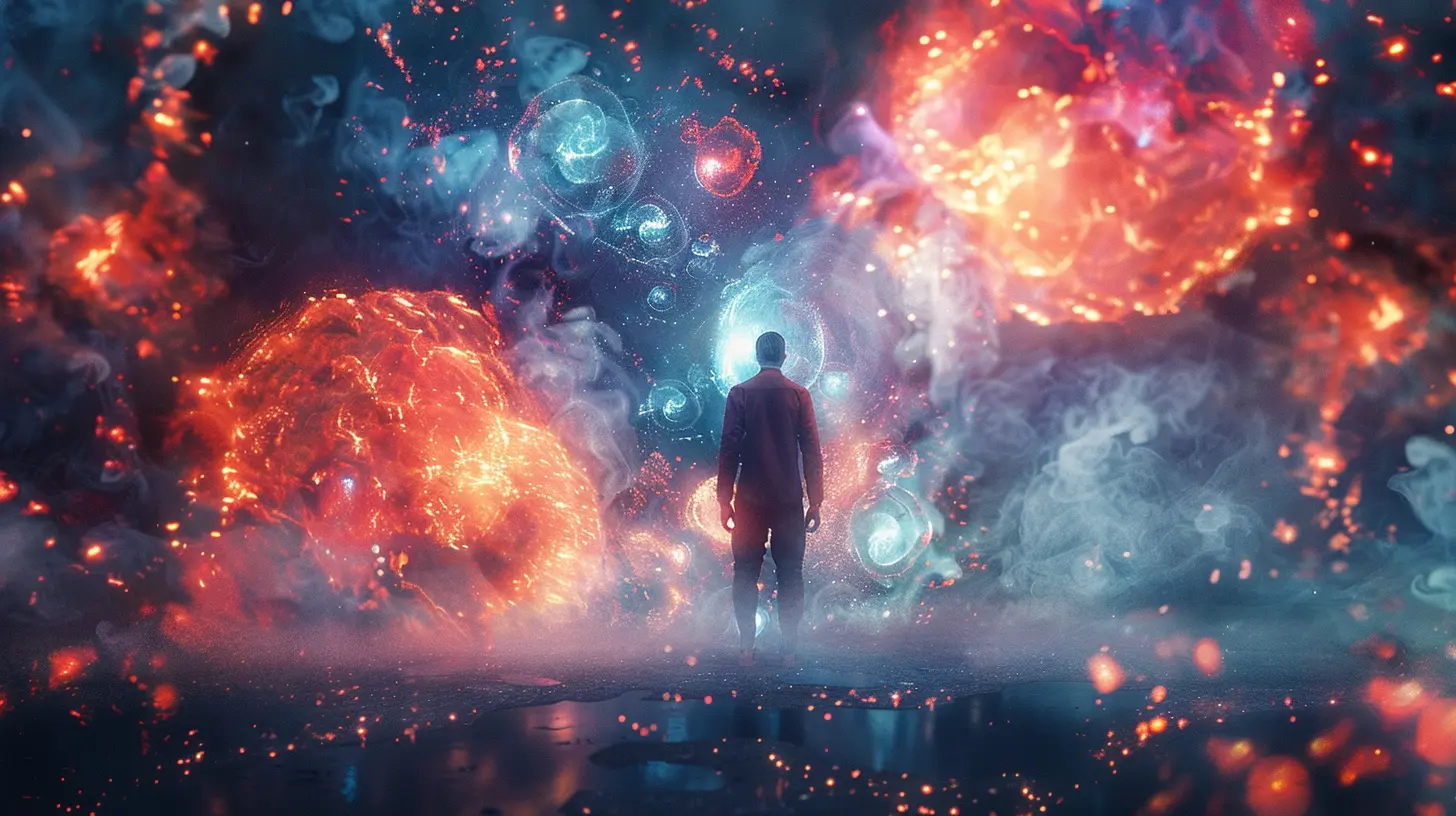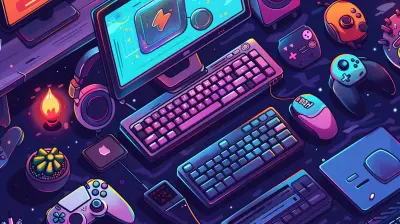Combo Systems Explained: The Psychology Behind Chaining Moves
1 October 2025
We've all been there. One minute, you're furiously mashing buttons, praying for a miracle in a heated match; the next, your opponent obliterates you with a series of fluid, jaw-dropping combos. Whether you're playing Street Fighter, Tekken, or Super Smash Bros., there's no denying the adrenaline rush (and salty frustration) that combo systems bring to the gaming table. But have you ever paused and wondered, "Why do combos work the way they do? What’s the psychology behind them?"
In this article, we’re diving deep into the world of combo systems, uncovering not just how they work mechanically, but why they resonate so strongly with us on a psychological level. Because—let’s be honest—understanding the science behind chaining moves might just help you level up your game AND appreciate why combos are so dang satisfying.
What Are Combo Systems, Anyway?
So, let’s start with the basics. What exactly is a combo system? In the simplest terms, a combo is a series of moves strung together in quick succession, leaving your opponent helpless to counter once the first move hits. Think of it as a choreographed dance with devastating consequences.But here’s the kicker: combo systems aren't just about flashy animations or showing off your skills. They're a carefully designed feature in fighting games (and, increasingly, other genres) meant to amplify the intensity of gameplay. A well-timed combo can turn the tide of a battle, making you feel like a master tactician rather than just a button-mashing maniac. 
The Mechanics of Chaining Moves
Before we get psychological, let’s look at the mechanics. Most combo systems rely on a few key principles:1. Hit Stun and Frame Advantage
When you land a hit on your opponent, it puts them in a state called "hit stun," where they’re momentarily frozen and unable to act. The longer the hit stun, the more time you have to connect another attack—this is where combos take flight.Meanwhile, "frame advantage" refers to how much time you (the attacker) have to act compared to your opponent. If your move recovers faster than they can react, you’ve got the edge.
2. Cancel Windows
Ever notice how pros immediately launch into follow-up attacks after landing a punch? That’s the cancel window at work. Many games allow you to "cancel" the animation of one move into another, enabling seamless combos. Think of it as skipping the cooldown period—your character doesn’t wait; they dive right in.3. Move Synergy
Not all moves play nice together. In most games, some attacks naturally flow into others, while some combos require specific timing, positioning, or even in-depth knowledge of your character’s arsenal. It’s like solving a puzzle—but instead of pieces, you’re wielding fists, swords, or fireballs.
Why Combos Feel So Satisfying
Now we’re getting to the juicy part: the psychology behind it all. Why do combos feel so dang good to pull off? Why are they so addictive to watch AND execute?1. The Flow State
Ever hear of the "flow state"? It’s that magical mental space where you’re completely absorbed in a task, performing at your peak without even thinking about it. Combos are tailor-made to trigger this state.When you chain moves together successfully, your brain’s reward center lights up like a pinball machine. Dopamine—the “feel-good” neurotransmitter—is released, making you feel accomplished, powerful, and, well, like a total badass.
And guess what? The more you practice combos and get into that flow state, the more your brain craves it. It’s a positive feedback loop that keeps you coming back for more.
2. The Illusion of Mastery
Combos trick us into feeling like masters of the game, even when we’ve barely scratched the surface. Think about it: you might not fully understand all the mechanics or strategies, but the second you land a flashy 10-hit combo, you’re on cloud nine.It’s like nailing a guitar riff without knowing how to read sheet music. You feel skilled, even if some of it was muscle memory or luck. And that psychological boost? It’s what keeps players grinding in training mode, perfecting their craft.
3. Power Dynamics
Let’s not ignore the elephant in the room: combos are inherently about power. When you chain moves, you’re not just dealing damage—you’re asserting dominance over your opponent. You’re saying, “I’m in control now.”Sure, it’s just a game, but our brains don’t care. From an evolutionary perspective, humans are wired to seek control and dominance in competitive situations. Combos tap into that primal instinct, scratching an itch most of us didn’t even know we had.
4. Spectacle and Storytelling
Pulling off a perfect combo is like crafting a mini story within the match. There’s a beginning (the opening hit), a middle (the chain of moves), and an end (the finishing blow). It’s dramatic, it’s cinematic, and it’s a guaranteed way to get the crowd or your couch buddies hyped.Even as spectators, we can’t help but admire the artistry behind it. Watching someone execute a high-level combo is like watching a dancer nail their routine—it’s mesmerizing. 
The Flip Side of Combos
Of course, combos aren’t all rainbows and dopamine hits. For beginners, they can be daunting, even overwhelming. Ever play against someone who just juggles you like a hacky sack the entire match? Yeah, not fun.1. The Skill Gap
Combos have a way of widening the skill gap between players. If you don’t know how to break out of one or counter it, it’s easy to feel helpless. And honestly? That sucks.2. Repetitive Gameplay
There’s also the risk of repetition. In some games, certain "optimal" combos get overused, leading to stale gameplay. When every match becomes a highlight reel of the same three combos, the excitement starts to fade.The Psychology of Learning Combos
Here’s the silver lining: learning combos isn’t just about memorizing inputs. It’s also about rewiring your brain.When you practice combos over and over, you’re building muscle memory. Your brain learns to recognize patterns and execute them without conscious thought—kind of like typing on a keyboard.
And guess what? Failing is part of the process. Every dropped combo, every missed timing—it’s all helping your brain fine-tune the necessary pathways. So, if you’re struggling to nail that perfect string, don’t beat yourself up. Practice makes progress, not perfection.
How Developers Balance Combos
Game developers face a tricky challenge with combo systems: they need to make them rewarding without making them overpowered. It’s a fine line between “epic” and “broken.”Here are a few ways they strike that balance:
- Scaling Damage: Many games reduce the damage of each successive hit in a combo, preventing players from one-shotting their opponents.
- Escape Mechanics: Features like "combo breakers" or "burst meters" give players a chance to escape when they’re caught in a particularly brutal chain.
- Meter Management: Complex combos often require resources (like energy or super meters), forcing players to think strategically about when to unleash them.
Why Combos Keep Us Hooked
At their core, combos are more than just gameplay mechanics—they’re a psychological playground. They tap into our desire for mastery, our love of spectacle, and our need for control. Whether you’re a casual button-masher or a tournament-level pro, combos have a way of making every match feel exciting and unpredictable.So, the next time you land that perfect chain, take a moment to appreciate the artistry AND psychology behind it. Because in the world of gaming, combos aren’t just a means to an end—they’re a language, a skill, and, most importantly, a ton of fun.
all images in this post were generated using AI tools
Category:
Game MechanicsAuthor:

Leandro Banks
Discussion
rate this article
1 comments
Mandy McKittrick
This article adeptly unpacks the intricate relationship between combo systems and player psychology. By exploring how chaining moves fosters a sense of mastery and reward, it illuminates the emotional engagement that drives player retention.
October 13, 2025 at 3:51 PM

Leandro Banks
Thank you for your insightful feedback! I'm glad you found the exploration of combo systems and their impact on player psychology engaging. Your reflections on mastery and emotional engagement highlight the core of the article.


